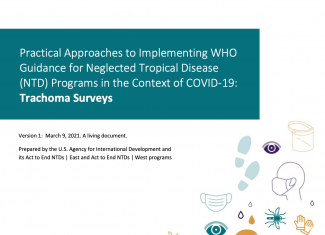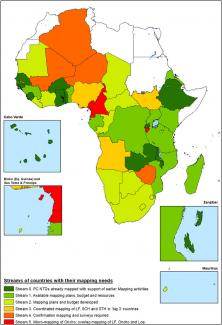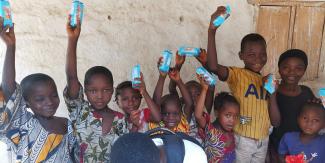Mapping is an essential element for each of the neglected tropical disease (NTD) programs advocated by the WHO.
Resources
Journal publication - Safely resuming neglected tropical disease control activities during COVID-19: Perspectives from Nigeria and Guinea
To understand the challenges, opportunities, and recommendations for maximizing continuity of disease control during public health emergencies, we sought perspectives from Nigeria and Guinea on the process of restarting NTD control efforts during the COVID-19 pandemic.
Restarting Neglected Tropical Diseases Programs in West Africa during the COVID-19 Pandemic: Lessons Learned and Best Practices
In line with the WHO recommendations and guidance issued in April 2020, USAID advised Act | West to temporarily suspend NTD field activities.

Severe Adverse Event Webinar
Adverse events (AEs) particularly severe adverse events (SAEs) during and following mass drug administration have a serious effect not only on the people who are affected directly, but also on the viability of the MOH’s national NTD control program.

Trachoma Surveys: Practical Approaches to Implementing WHO Guidance for Neglected Tropical Disease (NTD) Programs in the Context of COVID-19
Trachoma baseline surveys, trachoma impact surveys, trachoma surveillance surveys, and trichiasis-only surveys are key disease-specific assessments of trachoma elimination programs, used to start mass drug administration (MDA), monitor progress, decide when to stop MDA, and inform attainment of elimination of trachoma as a public health problem.

Applying a quality improvement model to neglected tropical diseases program implementation: supporting programs in identifying keys for sustaining operations
West African neglected tropical diseases (NTD) programs have made great progress toward the elimination/control of NTDs amenable to preventive chemotherapy. However, some districts have failed impact surveys—notably for lymphatic filariasis and trachoma—due to implementation inadequacies, despite reporting good mass treatment coverage. A quality improvement framework has been initiated to strengthen country program interventions and address issues that hinder their ability to achieve the World Health Organization NTD road map elimination/control goals.
The workshop aims to present an innovative model for improving implementation and discuss ideas, strategies, and plans for initiating quality improvement (QI) activities. Experiences from Ghana and Sierra Leone in the design and implementation of the QI model will be shared.
Risk factors associated with failing pre-transmission assessment surveys (pre-TAS) in lymphatic filariasis elimination programs: Results of a multi-country analysis
This paper reports for the first time factors associated with pre-transmission assessment survey (pre-TAS) results from a multi-country analysis. This information can help countries more effectively forecast program activities, such as the potential need for more rounds of mass drug administration, and prioritize resources to ensure adequate coverage of all persons in areas at highest risk of failing pre-TAS.
Improving Mass Drug Administration Tools
The Carter Center's Emily Griswold presents on improving mass drug administration tools on January 16, 2020.
Lymphatic Filariasis Operational Research Updates from NTDSC
Updates on operational research for lymphatic filariasis were shared from the Neglected Tropical Diseases Support Center on January 16, 2020.

